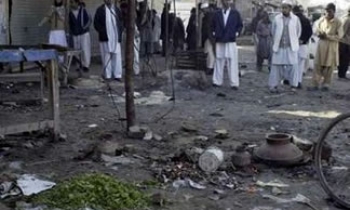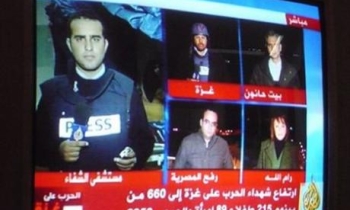WHILE some say Muslims just can't take a joke, it turns out the joke is on us. Across large swaths of the Middle East and in the West, the report card on free speech contains more F-words than the dialogue in Team America: World Police.
When a Danish newspaper published 12 cartoons of the prophet Mohammed to test whether multi-cultural Denmark was committed to freedom of expression, much of the Arab and Muslim world went feral at the very idea of free speech and an independent press. No surprise there. Any excuse for a fatwa against the West sums up the hysteria sweeping the Middle East.
In the West, we've also flunked the free speech test for our feeble defence of those values. The West's recreational appeasement of cultures diametrically opposed to Western values got us into this mess. So it turns out the newspaper had a point.
Scandinavian countries are often held up as the bellwethers of progress. In this case, it's more a case of Denmark pointing out where progress has gone awry. To understand the slow surrender of Western values, consider how this fracas over free speech began.
Back in September, celebrated Danish author Kaare Bluitgen was planning to write a children's book about the prophet Mohammed. But, alas, no illustrators were willing to draw the prophet for fear of offending Muslims, who believe that depicting Mohammed is blasphemous.
So the editor of Jyllands-Posten threw down the gauntlet to test whether Denmark was committed to free speech. As part of an article on self-censorship, they invited dozens of artists to draw a cartoon of Mohammed. Twelve responded.
And the rest, as they say, is history. A frenzy of bomb threats, boycotts, fatwas and flag burning. Jihadists in the UK declared holy war. Danish and Norwegian embassies were attacked and burned. Cheesed off at the cameras moving from Iraq to neighbouring Muslim countries, the media savvy supporters of Shiite leader Moqtada al-Sadr went on a hunger strike in central Baghdad to show their disgust over the cartoons.
And in an especially neat twist, leaders in Arab and Muslim countries began ululating about human rights. In this case, the right not to be offended. But pointing the finger at Western insults, while you go in for state and judicially sanctioned Bible burning, eye-gouging, maiming, flogging and the execution of children is not a convincing look.
Muslim hypocrisy aside, the reaction of many in the West to the Danish cartoons is also short of the mark. While newspapers across Europe reprinted the cartoons in a show of support for free speech, the response by many Europeans has been decidedly Europeany - one tentative step forward and two sissy steps back in defending Western values. In France, when a Paris newspaper reprinted the cartoon, the editor was promptly sacked.
And the Danish Prime Minister, Anders Fogh Rasmussen, who has taken a strong stance in defending democracy and freedom of expression, is not receiving much support from the Euro-elites.
Back in December Franco Frattini, vice-president of the European Commission said: "I fully respect the freedom of speech, but, excuse me, one should avoid making any statement like this, which only arouses and incites to the growing radicalisation." In the past few days, it's been good to see other European leaders - even Frattini - firming up on free speech. But his criticism of the cartoons as "imprudent" is making headlines in Muslim countries. Along with comments by the Council of Europe's Commissioner for Human Rights, Alvaro Gil-Robles, who also criticised the cartoons because "freedom of expression ... has its limits".
It's a bad sign when the cafe set of Europe echoes the Arab street on free speech. A survey by the Khaleej Times in the United Arab Emirates found that most people believed that "freedom of expression is one thing, but it should not be confused with acts of inciting feelings, which is what happened in Denmark".
If inciting feelings has become the new benchmark for free speech, we only have ourselves to blame for that misunderstanding. So many of the incursions on free speech in the West are driven by a well-meaning desire to create a world free of offence. A universal nanny state where all is peace and love, and never a cross word is spoken.
It's an impossible dream. Indeed, it's a nightmare. People invariably differ and it is debate and difference of opinion that drives progress.
We have already gone way too far in restricting free speech in an effort to protect people from offence. Tony Blair's religious hate bill is aimed at protecting Muslim sensibilities. And last week, it was only watered down because the British Prime Minister failed to hang around to vote in the House of Commons. By a single-vote margin, the bill is now free of key clauses that sought to outlaw "abusive and insulting" behaviour inciting religious hatred. But under Blair's bill, these silly cartoons could have been deemed an act of religious hatred.
Closer to home, Victoria's religious vilification laws are working in ways that make the place look like an Islamic state-in-waiting. Recall the two Christian pastors hauled into a Victorian court and threatened with jail time for daring to criticise Islam. Publish these cartoons south of the Murray in Victoristan and you too might be charged with religious vilification. It's a state overflowing with rights. But freedoms - such as free speech - are thin on the ground.
If freedom of speech means anything, it means the right to offend the sensibilities of others. Standing up for the right to express namby-pamby, inoffensive opinions is the easy part. It's defending the confronting, offensive and insulting stuff that tests our commitment to free speech.
That commitment is looking rather threadbare in Australia, given that only Queensland's Courier-Mail has published the cartoons. And why have the commentators, lawyers and artistes, who were so loud in condemning sedition laws as an incursion on satirical free speech, gone mute?
The Australian says publishing these cartoons will add nothing to the debate. But if 12 silly cartoons are enough to spark the hysterical over-reaction by Muslims, then this is a confrontation we need to have. Not publishing the cartoons adds to the debate by suggesting we will walk on eggshells in appeasing Muslim sensibilities. The spontaneous reaction across the Middle East has morphed into planned intimidation of the West and its values. And it seems to be working. Those opposed to free speech are learning that the louder they shout, the faster we surrender.
When we're talking about ideas - and religion is, after all, just an idea - the touchstone of free speech should be that old nursery rhyme: "Sticks and stones may break my bones, but words will never hurt me".
Laws need to protect us from violence, but not from hurt feelings. By all means, apologise for the offence caused to Muslims by the 12 cartoons, but not for their publication. The former is good manners. The latter is free speech.









